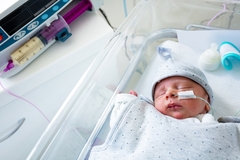Milk tube feeding safely replaces IV drip for premature babies
Key takeaways
- Premature babies born eight-10 weeks early can be safely fed milk via a stomach tube immediately after birth, replacing intravenous nutrition.
- Full milk feeding from birth reduces the need for medical procedures and intensive care time without increasing the risk of complications.
- This change in practice allows families more involvement and supports establishing breastfeeding earlier.

Premature babies born between eight to ten weeks early can be fed with milk through a tube in their stomach right after birth instead of being fed intravenously through a drip, according to new research.
The new findings of the “FEED1” trial, published in the Lancet Child & Adolescent Health, support that early arrivals no longer have to undergo painful medical procedures, such as having lines put in their veins to give them nutrition.
“The FEED1 trial answers important questions for the care of preterm babies – the results mean babies born eight-ten weeks early can be milk fed from the start, will not need intravenous nutrition, and will likely spend less time in intensive care,” says lead investigator professor Shalini Ojha, Neonatal Medicine at the University of Nottingham, who is also an honorary consultant neonatologist at University Hospitals of Derby and Burton (UHDB) NHS Foundation Trust.
“They can be cared for in special care where families can be more involved and supported to establish breastfeeding. We are extremely grateful to the families who participated in the trial.”
Full milk feedings safely boost health
Previously, premature babies were not started on full milk feeds because of concerns of a serious bowel disease called necrotizing enterocolitis (NEC). However, growing evidence suggests that premature babies who are not too sickly can be successfully prescribed larger milk feeds without increasing this risk.
In the UK, 2,088 premature babies from 46 NHS hospitals participated in the FEED1 trial between October 2019 and July 2024. Among them, 1,047 were randomized to have full milk feeds while 1,041 were gradually fed and had intravenous nutrition.
Babies in both groups needed to stay in the hospital for about 30–35 days. However, those fully milk-fed from day one needed fewer medical interventions and less time in intensive care without a greater risk of low blood glucose levels, NEC, or infections.
“These important findings have shown that babies can receive full milk feeds safely, without any compromise to their health while on the neonatal unit,” says Josie Anderson, policy, research, and campaigns manager at Bliss, the UK’s largest charity for babies born premature or sick.
“We believe these findings will help improve clinical practice for babies born from 30 weeks, ensuring they can receive the best possible care and benefit from having fewer painful procedures.”
Professor Anthony Gordon, director of the National Institute for Health and Care Research’s (NIHR) Health Technology Assessment Programme, which funded the research, stresses that the first few days of babies’ lives are a critical time for their development and bonding with their families.
“That’s why it’s so encouraging that findings from this major trial show preterm babies can be safely milk fed through a tube rather than intravenous feeds, meaning they can avoid uncomfortable medical procedures and can spend less time in intensive care,” he notes. “This demonstrates how NIHR-funded research improves quality of life for patients and boosts the efficiency and effectiveness of NHS treatments.”
Trial participant commentary
Around eight in 100 babies in the UK are born prematurely (before 37 weeks of pregnancy), highlight the researchers.
Zara Shafiq and her son Idrees were also involved in the FEED1 trial. Shafiq remarks: “We had a very positive experience during the FEED1 trial. Our son Idrees was born at 30 weeks and received excellent care and support from the NICU staff.”
“We were kept well informed about his care during the four weeks we were there. Idrees was taking his feeds well and transitioned smoothly from tube to bottle feeding. We are deeply grateful for the support we received.”
The results of the FEED1 trial are published in the Lancet Child & Adolescent Health. The trial was sponsored by UHDB and coordinated by the Nottingham Clinical Trials Unit at the University of Nottingham. It was funded by NIHR, and was supported by Bliss.
Among recent studies in the field, scientists have found that shorter storage durations of donor human milk may reduce gastrointestinal complications in premature infants, including necrotizing enterocolitis. Minimizing milk storage time may help preserve protective properties that are critical for preterm gut health, they suggest.











